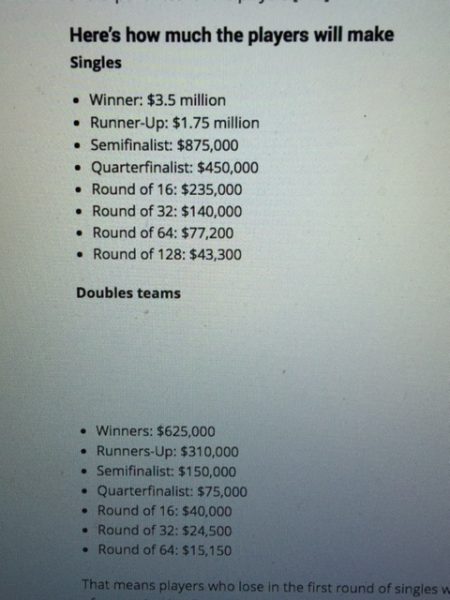This has always been the case. But it has gotten worse and worse through the years I’ve been racing. If prize money was even going to just keep up with inflation, then most pros racing domestically would be making an okay living just off prize money. That isn’t close to the case.
I was reminded of this again, because I just saw the prize list of US Open in tennis. The winner gets 3.5 million, which seems reasonable, I guess. But if you just get into the tournament, loss in the first round, which means you finish tied for 128th, you’d get $43,300. That is a lot more money that nearly every domestic professional cyclist makes total for a year of racing.
I’m not sure why professional cycling in doldrums. It always has been a blue collar sport, but this is ridiculous. I don’t think there is a race in the US where a rider can win what you can get for last place for one tennis tournament.
I think it might be because the promoters used to look out for the well-being of the riders. I don’t think that is the case much anymore. Bike racers and the promoters used to have a symbiotic relationship going. I think the money is harder to come by to put on a race, so the prize lists are what suffers first. Whatever the reason, no one, minus maybe Daniel Holloway, could pay for a season of racing from their winnings.
I’m heading to downtown Topeka to watch Bill and Catherine do an Urban Adventure Race. They are both going to be crippled after. We’re supposed to go on a long-ish road ride at 1pm. I doubt they will participate, even though yesterday they were all gung ho.

I got Tucker pet insurance. He’s gonna need it if he keeps sleeping with his neck in these strange positions.







First you need to define “PRO”. A guy/gal with a pro license? How good do you think you need to be at tennis to get into the US Open? Do you think a tennis player at a level similar to yours in cycling could get in? We used to joke when I raced (with a pro license) motorcycles “How can you call this a professional sport when the equipment needed to participate costs more than you could ever hope to win with it?”
TV rights fees are the key to big paychecks in sports and pro cycling (with the exception of TdF and a few other big events) doesn’t command any – too often it’s the promoter PAYING the TV network to show their event. I don’t see this changing any time soon.
Who’s Daniel Holloway?
Bryan – Daniel is a rider, who used to race “professional” but now travels around and wins just about every event he enters. He doesn’t really have a team, so he keeps all his winnings, which is substantial. He can win road races, criteriums, he even races the Red Hook fixed gear races.
Larry nailed it. The reality is we’re a fringe sport and will always garner fringe money. Big money sponsors go where big spectator numbers are.
I think Larry is right, but I also think the Midwest Cornfield and East Coast races can still work in your favor if you are a 20-ish single (marital status) without a mortgage type rider.
But even within cycling, there are more entities clamoring for the sponsorship dollar: mountain biking, CX, and triathlon hardly existed. BMX was a local sport. Add that in to the creation of numerous “extreme sports” all competing for sponsorship dollars.
I butt heads with David Pelletier from time to time on Facebook, but I would be the first one in line to help him put on another national series. No matter whether it is road, MTB, track or whatever, a promoter who can put on a national series can sell it easier as a package to TV, which means an easier sell to sponsors, which means more money in riders’ pockets. Right now there is no national series. Sure, there are a bunch of individual events strung together to create a series, but not driven by a single entity that can get sponsorship for the whole package.
One other thing: Money that use to go to prize lists now goes to paying for police service.
Mid 80’s to mid 90’s, a $5,000 Pro I/II race was a big regional event – all the region’s best would be there – and a $10,0000 race was where you’d find a smattering of national level Pro/Am riders (7-11, Wheaties-Schwinn, Coors Light, etc.). Races with that level prize list were pretty common; and if you had a reliable car you could hit one on east coast or Midwest about every other weekend thru the heart of the season. Now those events don’t even occur!
Put on a race and then you’ll know.
In addition to the big money sponsorships that have already been mentioned earlier, the US Open also runs for several days at a time and charges a fairly steep admission fee for spectators just to get on the grounds w/ general admission seating. Reserved seating is even steeper.
TV rights, I meant.
This spring I Watched Holloway race a local Pro 1-2 crit here in Denver.
Less than a quarter of the race in he went off with another guy, dropped him, then soloed for half the race, got caught with a few laps to go, and still won the field sprint.
Impressive.
Prize money is directly related to how much money promoters can make from sponsors and exposure. If sponsors don’t feel they’ll get enough exposure to justify an investment, the prize money is going to be limited. Just for conjecture sake, this site shows the heirarchy of sport popularity. Not to mention Lance didn’t do the cycling world any favors, he boosted popularity immensely, and then his actions and personality destroyed those inroads.
http://www.topendsports.com/world/lists/popular-sport/fans.htm
Comparing to tennis, and the US Open, is a long shot. Arthur Ashe Stadium, where the primary matches take place, just got a $100 million retractable roof – for a facility that basically is used 2 weeks a year. It’s a different game altogether.
Cycling had its day in the 1980s and early 1990s, but has resumed its place as a small, fringe sport (Don’t get me wrong; I love the sport). I don’t think it’s a direct lack of interest as much as fragmentation – road racing, BMX, Mountain Biking, triathlon – for the small audience who wants to see these things, too many choices.
I love watching the TDF, Giro, Vuelta, etc, but to most people, who haven’t ridden themselves, they don’t understand what goes into it. It’s like marathoning – the people who win make it look effortless, and it’s hard to embrace. The way to build the sport is to engage people as participants, but riding the road on a bike is becoming scarier and scarier to the average person. I ride every day and the number of people under the age of 30 out on bikes is miniscule.
It was touch & go for many in the early 1980’s and it was possible to live like a carny-bum on winnings in the Midwest and east coast but many guys bailed on the sport because it was a tight proposition. Too many of some of the better riders threw up their hands and went off to college because it was too tight. We would always marvel at some of the pretty marginal riders who stuck it out and beat-up on the 19 and 20 year olds when they themselves were 28-29-30 years old.
What’s amazing according to this link is that, if it’s to be believed, field hockey is more popular and profitable than the NFL. Wow. I was just watching it during the Olympics and trying to understand it as a minor sport. The link says it’s 250% more profitable than Pro football. Cycling must be way down that list.
I also agree with Barb that Lance’s legacy is that everyone just assumes it’s all cheating.
The upcoming Emmitt Smith Grand Fondo has $10k winner take all on offer.
+1 on the comment about the cost of police service. The race that I recently put on required 3 sheriffs, each paid at $63/hr for 8 hours. The function they performed was critical to the safety of the race, but that is some serious coin. That rate is cost prohibitive enough for most organizers to just drop it and either put on just another crappy office park crit, or do nothing.
Doping and guns.
When cycling was at it’s most recent climax in the US, it couldn’t cross into the mainstream because doping destroyed it.
The time before that, it had a a long interruptions because somebody was accidentally shot. Amazing comeback, obviously, but the interruption stopped the sport hitting the true mainstream.
That’s whey these high-prize Gran Fondo’s attack so many dopers. The Gran Fondo New York has been plagued with then since the overall winners gets a rather pricey bike.
Yep, Larry nailed it and Carl added another great point. Its a fringe sport that is really just a hobby. For the 20-something with no adult-life stuff to deal with yet, they can get a bunch of bikes and a small stipend sponsorship, split an apartment in Boulder with 5 other 20-somethings, travel the country and “live the dream” of being a pro cyclist. I did that in MTB for 2 years in my 20’s, but times have changed. MTB racing (NORBA) was huge back then, with a defined national series and UCI world cup events here in the States, and big corporate sponsorship (JEEP). Now there is no national series and no world cups stateside. Local scenes are doing really well but that just builds the already fringe sport into more isolated pockets of popularity independent of each other. Sponsorship dollars at the local level are hard to come by.
I didn’t know who Daniel Holloway was either. Whatever happened to Chad Gerlach? Heard he was pretty talented.
A little known fact is that the United States also sent field hockey teams to the Beijing Olympics… I think it’s pretty popular in places other than America..and football isn’t that popular in places other than America. I think if Lance hadn’t been outed as a cheater, cycling in America would have continued to grow and prize money would have continued to increase. He really started an American love affair with cycling. Then his ego and arrogance indirectly ruined it. I have a feeling he’s a lot more humble these days than he was during that era.
Mike: Classic comment. You do have to wonder how much cycling would have exploded in the US had “LeMonster” not been all shot up after his first TDF win. Can’t imagine he was operating at much more than 80% after that type of type of trauma to the system. The fact he was able to still produce performances like his ’89 WC begs one to think what he could have done if he was whole…
I hate to get into the doping aspect of things, but it is disappointing to see a guy like Bobke who based on his books respected the hellout of LeMond (and was literally treated like a brother by him) never had the f’ing balls to come to his defense vs. LA. I love Bobke, but I have never understood this.
Imagine what the ladies of cycling get, a lot less. Even if LeMond was not shot the sport would not have gone mainstream in the U. S. or it would have fizzled. Bottom line is it is boring to watch 3 hours of the pack rolling along unless you are hard core fan. In the 70’s the NY Cosmos would sell out 50,000 seat Giants Stadium while youth soccer was just beginning. Now, every kid grows up playing youth soccer and the pro league in the U.S. fills small stadiums and had no big TV presence. Football is king because there is action every minute compared to baseball. NASCAR is huge but the velodrome can’t get on public access TV. Go figure.
Us open tennis would be the top 128 in the world. If you are good enough one can enter qualifying rounds and if successful in winning in qualifing rounds will end up in the first round ia a major tournament.
The rest of the pro ranks are on the sat. tour and live out of a suitcase hoping to break even traveling the world. All in hopes of breaking the top 250 in the world.
I guess I would say the majority of pro rank tennis players lead similar lives to a pro rank cyclist.
I agree that watching cycling seems like something I’d just avoid doing unless LeMond and Fignon could duke it out again. Then again, I think watching more than about five minutes of tennis is pretty boring also unless somehow Conners and McEnroe could emerge from a time machine.
By and large, most people would rather ride their bikes than watch others ride their bikes (no matter how fast). I am perplexed why tennis gets the media attention and prize money it does. For instance, I can’t recall hearing any “water cooler” talk about tennis since the days of at least Sampras–and even that was pretty limited. Tennis was trendy for a brief time in the 70s but people realized how difficult (and expensive coaching was) to play the game at a reasonably decent level. Biking in the bay area (and now Seattle area for me) seems far more popular than tennis.
Another reason cycling doesn’t garner the attention and prize money is BETTING.
U.S. major television sports-basketball, football, baseball, hockey, and even tennis. Oh; and don’t forget golf-have the attraction of legal and illegal betting (…in America; I believe betting on cycling in Europe has a greater following.) . Also, I think cycling doesn’t have the macho image of those sports mentioned above, so the beer swilling fat slob isn’t plopped into his La-Z-Boy after work to watch. As has already been mentioned, selling television rights is necessary to the sponsors having enough income to provide a decent prize list.
Had he challenged LA at that time, what do you think would have happened to his career? Besides, LA was a friend as well. Not everyone is required to be the Jeff Novitskie’s of the world. It’s easy to sit here and throw stones.
I am certain that I just probably mangled the Jeff guy’s last name.
http://fivethirtyeight.com/features/tennis-has-an-income-inequality-problem/
Tennis isn’t much different than cycling. And nearly all sports are the same – top heavy payouts. Don’t forget in sports like tennis and golf, the player is essentially an independent contractor, covering all their own travel, coaching and management expenses. I’ve seen other articles putting expense level’s at near $100k for top level golf and tennis tour, and in tennis the break even level being around 100th world ranking.
Of course if you get a big story, and a lot of money can start getting injected into your sport. But that ends eventually too. Even Adidas and Nike recently pulled out of the golf equipment market, the Tiger story is no longer relevant and even though the prize lists are high, you’ve got to be in the top 128 to guarantee your next season at the top level.
Yeah, cycling prize money will suck as long races and teams are independent and few races can actually “charge” for their product (license coverage).
Hear, hear!
Tennis was the work of a brilliant marketer who created a pro-level set of heroes (Connors, McEnroe, King), sold it to television early, and the rest all just supported that. The complete reverse of pro cycling.
Look at pro baseball. You get drafted out of high school and you spend the next several years earning less than minimum wage. Players often live in the homes of hosts who happen to be fans of their minor league teams. At least that’s what the smart ones do, so they can bank (or invest) their signing bonus money. The dumb ones blow their signing bonus money on cars and rent. The good news for baseball players is that if you fail to progress, the end of the road is finite and defined for you. If you’re lucky enough to make AAA (and they don’t call you up to “the show”) they just release you and your time as a pro is over. Pro bike racers can keep renewing their pro license well into their fifties 🙂
“Tour of California” got around a bunch of the stuff that really eats away at event revenue by demanding the host start/finish pay for all of it and more. Free hotels, port-a-potties, barriers, law enforcement, free food, free booze, extra water and power, a fat Internet pipe, all paid for by the taxpayers.
Paul Boudreaux – good points. I think Bobke had to play along with the hand that was feeding him just like the other talking heads, writers, magazines, bike producers…..
The funny thing about dopers & Bobke is his repeated stance on “amateurs shouldn’t dope!” which sounds a lot like “it’s OK to dope if your paycheck riding on it.” Those old Slurpee boys and their hard line on doping . . . outside of Hampsten they all are pretty quiet on the whole topic and for a group that fancys themselves as the US flag bearers in pro cycling their silence on the topic is very, very telling.